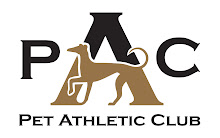Hello PACmembers...
There are a number of dangers for pets that pop up during the holiday season. Here is a list of things to watch out for while you are celebrating with your pet:
A number of Christmas season plants are poisonous to pets if eaten: ivy - moderate to very toxic, all parts; holly - moderate to very toxic, especially the berries and leaves; mistletoe - very toxic, all parts, especially the berries; Christmas greens such as balsam, juniper, cedar, pine and fir - all parts have a low level of toxicity; hibiscus - may cause vomiting or bloody diarrhea if ingested; and poinsettias - leaves and stems low in toxicity. This is not a conclusive listing...there are many more toxic plants. An additional listing of both non and toxic plants can be located here. It's wise to keep plants out of your pets' and children's reach.
Replace metal ornament hooks with tightly knotted fabric 1/4 inch ribbons, light-weight twine or yarn to slip easily over the branches of the tree.
Keep gift ribbons and bows out of sight to prevent chewing and swallowing.
Resist the temptation to tie ribbons around pets necks for the holidays. The pets can tighten ribbons resulting in choking or hang themselves if the ribbon is caught on an object.
The beauty fire salts is amazing on a winter's evening - moderate toxicity; symptoms are gastrointestinal irritation with vomiting and a variety of other manifestations, including convulsions.
Hang your treasured ornaments higher on the Christmas tree. Use wooden, medal, resin-cast or the like on the lower branches in case curious little paws want to play with bright and colorful ornaments. Tinsel isn't toxic, but if ingested, intestinal obstruction and choking are potential problems...
Please do not use angel hair (spun glass) - low toxicity; can cause irritation of the eyes, skin and gastrointestinal tract. Artificial snow and snow flock also has low toxicity - dry particles are inert; however, toxicity from inhalation can occur if spayed directly in the mouth.
If you are planning to take your pet with you when visiting friends and relatives during the holidays, be sure to contact them in advance to find out if your pet is welcome. Because of the excitement during the holidays, it might be best for you to board you pet at the PET ATHLETIC CLUB....
Increased activity and visitors during the winter holiday season can upset your pet's routine. Try to keep your pet on his regular schedule for feeding and exercise.
BONES ARE DANGEROUS! Please, please don't feed your pets bones, especially poultry bones. Poultry bones splinter easily - each year thousands of pets are treated for consumption of splintered bones, causing pain and sometimes death.
Though it's tempting, don't give your pet large quantities of cooked turkey and ham during the holidays. Human food is too rich; overfeeding of human food can cause additional health problems and feeding human food will often lead to unsatisfactory eating habits when given pet food at their regular mealtimes. Consumption of human food can also result in begging, an aggravating habit hard to break, when the family sits down for meals.
Cover or tack down electrical cords.
All other decorations should be carefully placed so that the pets can't pull or scratch off any small pieces to swallow.
Watch out for candles - pets are attracted to the bright "lights" in a darkened room. Not only could they receive serious burns, but they could knock the candles over, spilling hot wax onto furniture and carpeting.
Those adorable holiday costumes for your pets may be cute at get-togethers or in family photos, but pet owners should be wary of costumes which have rubber bands to keep them securely in place on the pet. If rubber bands are accidently left on, the pet could chew off and swallow them, causing choking and/or intestinal injuries. Never leave a costumed pet unsupervised!
Be alert to any pet hazards such as noise-makers and confetti which can very easily pose a serious threat to your pets' health. Noise-makers can frighten your pet causing the pet to bolt out an open door , or jump to a precarious area in search of safety.
Confetti can be ingested, wreaking havoc to the digestive tract.
Doors, gates and garages are opened and closed at a feverish rate during the holidays. The opportunity for your pet to get out and explore is much greater this time of year.
Tell The Guests, and Especially the Children, the Rules for Your Pet - what rooms they are or are not allowed, not to feed the pet scraps (if ten guests feed a 30 lb dog two scraps, you could have a very sick dog), and other rules of the house. Do not let children harass them.
At this time of year pets should not be allowed to run free. Due to the sound dampening effects of snow, pets often cannot hear cars coming.
For a few other dangers please check out:
http://www.chicagoveterinaryemergency.com/holidaydangers.pdf
This is certainly not a conclusive list of all possible pet dangers during the holiday. We see more pet incidents (vomiting, diarrhea, intestinal blockage, foreign body problems, etc.) during the holiday season than any other time of year...and a sick pet doesn't make for a very happy holiday!
Have a great day...your dog is!
The PAC Team
Friday, December 14, 2007
Subscribe to:
Comments (Atom)
